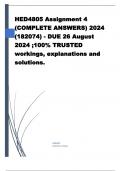HED4805 Assignment 4
(COMPLETE ANSWERS) 2024
(182074) - DUE 26 August
2024 ;100% TRUSTED
workings, explanations and
solutions.
ADMIN
[COMPANY NAME]
, Question 1 (See chapter 6 of the prescribed book.) (25) Critically discuss the
Bantu Education Act of 1953, and how students opposed its promulgation in
1976.
The Bantu Education Act of 1953 was a pivotal piece of legislation in South Africa's apartheid
system, aimed at segregating and controlling education for Black South Africans. Here's a
critical discussion of its implications and how students opposed it in 1976:
1. Segregation and Inequality: The Bantu Education Act enforced racial segregation in education,
allocating significantly fewer resources to Black schools compared to those serving white
students. The curriculum was designed to prepare Black students for menial labor rather than
providing them with opportunities for higher education and professional advancement. This
perpetuated inequality and limited the socio-economic mobility of Black South Africans.
2. Cultural Suppression: The Act also sought to undermine Black identity and culture by
promoting the superiority of white culture and history while marginalizing indigenous languages
and knowledge systems. This cultural suppression further alienated Black students from their
heritage and contributed to a sense of inferiority.
3. Resistance and Student Movements: By the 1970s, discontent with the apartheid regime,
particularly among the youth, was growing. In 1976, students in Soweto protested against the
government's decision to enforce the use of Afrikaans as the language of instruction in Black
schools. This sparked the Soweto Uprising, a significant turning point in the struggle against
apartheid.
4. Brutal Suppression: The government responded to the protests with brutal force, resulting in
numerous deaths and injuries. The images of police brutality against unarmed students shocked
the world and galvanized international condemnation of apartheid.
5. Solidarity and Mobilization: The Soweto Uprising marked a significant moment of solidarity
and mobilization among Black South Africans, inspiring further resistance against the apartheid
regime. Students played a central role in organizing boycotts, protests, and other forms of
resistance.
6. Impact and Legacy: Although the immediate impact of the Soweto Uprising was the loss of
lives and the suppression of dissent, it ultimately contributed to the international isolation of the
apartheid government and accelerated the dismantling of the apartheid system. The events of
1976 also highlighted the power of youth activism in effecting social and political change.
In summary, the Bantu Education Act of 1953 entrenched inequality and cultural suppression in
South Africa's education system, leading to widespread discontent among Black students. The
protests against the Act in 1976, particularly the Soweto Uprising, marked a significant moment
of resistance against apartheid, demonstrating the power of youth mobilization in the struggle for
freedom and equality.




